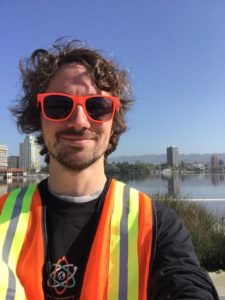This is a guest post by FoR BoD member Adriana Bankston.
During the month of April, Future of Research (FoR) supported multiple efforts towards advocating for science and scientists. FoR BoD member Adriana Bankston and FoR ED Gary McDowell participated in their local March for Science, in San Diego and Oakland/The Bay Area, respectively.
In addition, contributions from several FoR Board Members have also been spotted in the Science not Silence book – observe in more detail here.
Also, FoR is partnered with the Union of Concerned Scientists for the Science Rising campaign, as part of which BoD member Adriana Bankston wrote a blog post on engaging ECRs in science advocacy, policy and communication (screenshot from the post is below).
These events brought up the idea of organizing a larger discussion around science advocacy. On May 1, 2018, Future of Research and the Union of Concerned Scientists co-hosted a Twitter chat on engaging ECRs in advocacy, which also highlighted resources and strategies to help ECRs be effective science advocates. Check out the #AdvForSci hashtag for the chat, which was administered from the @FORsymp account. Several very active science policy groups participated in the chat: @SciPolUCLA; @jhscipolgroup; @UNC_SPAG and @HarvardSciPol. We were also joined by @STEMadvocacy and @dpham20 from @ASBMB. Below, we list the resources provided by each group for easy follow-up, but also to illustrate in some cases the similarities between ideas that are common to multiple participants.
EVENTS PUT TOGETHER/PARTICIPATED IN:
- Engaging ECRs in advocacy activities (Sci Pol Group UCLA)
- Science policy certificate, classes and mini-symposium (Harvard Sci Pol Group)
- Seminars & workshops on diverse topics (UNC SPAG)
- Eat and Advocate (JH Sci Pol Group)
- ASBMB Advocacy Training Program (ASBMB)
- AAAS Gov’t Relations Case Workshop (Sci Pol Group UCLA)
- Take advocacy from Congress to the streets (UNC SPAG)
- Science March DC (JH Sci Pol Group)
ADVOCACY RESOURCES FOR ECRS:
- Workshops, Webinars and Hill days from professional societies (JH Sci Pol Group)
- Engage in the local/national/international community, professional societies (Harvard Sci Pol Group)
- Guide for making an impact (PLOS ECR published), advocacy toolkit FASEB, AAAS Gov’t Relations Case Workshop (UNC SPAG)
- ASBMB Policy Toolkit (ASBMB)
- SciReach (The STEM Advocacy Institute)
LOCAL ADVOCACY ACTIVITIES:
- Getting to know the most pressing issues that align with your values (JH Sci Pol Group)
- Local offices, lab tours, showcase instruments, illustrate how create jobs (UNC SPAG)
- Start small – local science festivals, schools (The STEM Advocacy Institute)
- ASBMB Advocacy Training Program (ASBMB)
WAYS TO DEMONSTRATE ADVOCACY PASSION:
- Study the nature of science – develop questions/ideas/tools/insights (The STEM Advocacy Institute)
- Develop new opportunities for scientists interested in policy (ASBMB)
- Write blog posts on topic of interest (Harvard Sci Pol Group)
- Visit public schools and participate in science festival to educate about science (UNC SPAG)
- Engage the public & advocate for open science and equal opportunity (Harvard Sci Pol Group)
DEVELOPING ADVOCACY SKILLS FOR ECRS:
- Craft a message with the audience in mind (JH Sci Pol Group)
- Have an open, honest conversation (JH Sci Pol Group)
- Understand what the advocacy landscape looks like (ASBMB)
- Perform a landscape analysis using SciReach (The STEM Advocacy Institute)
- Engage with non-scientists and address intersectionality (UNC SPAG)
HOW INTERNATIONAL SCIENTISTS CAN ADVOCATE:
- Write op-eds, attend marches, plan & host advocacy events (ASBMB)
- Advocate for science in public (FoR)
- Take advantage of status in US institutions (UNC SPAG)
- Communicate the importance of working together (The STEM Advocacy Institute)
- Explore science diplomacy (Harvard Sci Pol Group)
HOW TO SUPPORT SCIENTISTS ENGAGING IN ADVOCACY:
- Seminars, workshops, collaborations, networking and job/fellowship apps (JH Sci Pol Group)
- Training opportunities for ECRs to explore science policy & advocacy (UNC SPAG)
- Incorporate this training into the academic fabric (Harvard Sci Pol Group)
- Institutional support & funding (JH Sci Pol Group)
- Faculty support of these efforts (UNC SPAG)
- Financial support and PIs supporting efforts (Harvard Sci Pol Group)
- Telling your story (The STEM Advocacy Institute)
- Engage in initiatives such as ScienceRising (FoR)
- Pie and donuts for hard working advocates 🙂 (ASBMB)
It was also great to see the chat information being shared by other groups including the ESEP coalition. We would like to thank the chat participants for taking the time to talk to us and share their wonderful resources and initiatives.
Overall, we hope the efforts highlighted in this post will create a stronger community of advocates, both for the scientific enterprise itself and for future generations of scientists. Let us lead by example and continue to facilitate the spirit of collaboration and sharing of knowledge among various groups and within our local communities.




